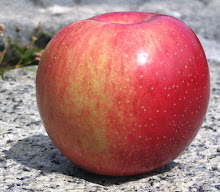A grower once shared this rule of thumb with me: An apple ages as much in a day on your kitchen table as in a week in your fridge.
The effect is probably even great than that, depending on the warmth of your kitchen and the coolness of your refrigerator.
As DeEll, Saad, and Khanizadeh (1999) put it,
Temperature is the single most important factor governing the maintenance of postharvest quality. Therefore, rapid cooling after harvest greatly improves firmness retention in apples during storage. Low storage temperatures are equally important. McIntosh apples have been shown to soften as much as 20 times faster at 21 degrees C than at 0 degrees C.
So even if you like to eat your apples at room temperature, refrigerate your apple purchases as quickly as possible if you want to keep them fresh.
The ideal storage temperature seems to be right around freezing: 32 degrees F or 0 C. Apples don't freeze until a few degrees colder than that.
However, when they do freeze, their cells rupture and they turn into one big bruise. So unless your refrigerator has an exceptionally well-regulated temperature, it's probably better to leave near-freezing thermostat settings to the pros.
Supermarket apples, out of season, were probably stored under controlled conditions, very close to freezing and perhaps in a special atmosphere.
Many sources recommend keeping apples that are unwashed (to keep out any water) in a plastic bag that is perforated (to let out any water vapor).
If you have a lot of apples and live in a cool climate, you may have success storing them in an unheated mudroom, cellar, or garage. Some sources tout wrapping each apple in newspaper, which makes sense to me although I've never tried it myself.
The newspaper keeps any rot from spreading and should even out any temperature fluctuations that could otherwise freeze, or accelerate the decay of, the fruit.
Apple firmness is strongly correlated with other freshness factors and is typically measured in terms of pounds of pressure that an apple can withstand from a measuring device.

Comments
Post a Comment
Join the conversation! We'd love to know what you think.